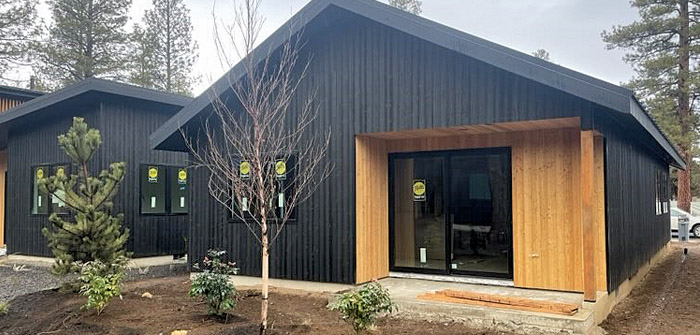(Sisters Woodlands, a mixed-use community, is partnering with Habitat for Humanity to build affordable homes for low-income dwellers | Photo courtesy of Sisters Habitat for Humanity)
The many charms of Sisters — touted as “a gem of the High Desert” with “its reputation as a western Camelot in the shadow of the Cascades” — are indisputable. Also undeniable is its scarcity of affordable housing (a challenge faced by Deschutes County as a whole) — unless you fall into the category of those making an average household income of $109,585.
A look at 125 current real estate listings in Sisters — starting with the fact that the median price for a single-family home in Sisters has steadily increased to $768,000 — underscores this economic disparity. While one 700-square-foot cabin built in 1969 can be had for $450,000, at the other end of the scale is a 10,463-square-foot home on ten acres with an asking price of $3,699,000. (Features include an elevator and indoor pool.)
Increasing Housing Supply in the Face of Population Growth
Community Development Director Scott Woodford readily admits that “one of the most important (issues facing Sisters) is increasing the housing supply to address affordability and meet anticipated demand” — especially as “our current population is projected to almost double in the next 20 years, which is kind of daunting.”
From 2,038 people in 2010, and 3,075 in 2020, projections for 2024 — according to Portland State University’s Population Research Center (PSU) — estimate that this number will grow to 3,823, making Sisters the fastest growing area in Central Oregon — with the population increasing by 23 percent, compared to Bend’s 6.6 percent.
City Manager Jordan Wheeler, who described the town as “growing really, really fast,” used new single-family home permits — 350 since 2020 — as a key indicator. “Even making a conservative estimate that only two people are living in those homes, that equals 700-800 more people,” he said, “and that doesn’t account for new multifamily developments.” Wheeler also pointed out that “the local school system built a new elementary school this year to accommodate recent growth.”
As a result of the fact that “Sisters is growing so fast,” the city has started the two-year process to expand its urban growth boundary (UGB) by 200-250 acres, Wheeler said.
According to Woodford, this figure was determined by calculating the town’s anticipated population growth, and resultant needs (including residential housing, employment lands, and school and park requirements) over the next 20 years. “We’ve drawn a one-half mile study area around the existing city boundary (per the State prerequisites), and “are now starting to hone in on areas that make the most sense to bring in the needed 250 acres — (excluding forest and farm land),” he said.
“By early next year, we will have incorporated key factors such as utilities, transportation, and environmental constraints into the proposal to come up with alternative expansion areas for the public to review, having set the number of residential acres at between 131 and 168.”
Woodford added that “Sisters is required by state law to accommodate future growth, and has chosen a path of partially growing up through increased landfill, and partially out by expanding the UGB. In fact, we have already amended the development code to allow both increased minimum and maximum density for multi-family units, thereby reducing the amount of expanded UGB land required to meet housing needs.”
Sisters Has County’s Highest Homeless Concentration
Underscoring the town’s lack of affordable housing is the harsh fact that, as County Commissioner Phil Chang has pointed out, “the highest concentration of homelessness in all of Deschutes County exists right there in Sisters.” And, he criticized, “it is a sign of a failed community that so many people who are part of the Sisters’ workforce (employed by local restaurants and grocery stores, for example), part of the family fabric of that community, are living in substandard conditions.”
Chang added that “there will come a time when people recognize that it is a reflection upon their community that this condition exists amongst them.”
Acknowledging that increasing housing supply can be a volatile subject, Woodford detailed a range of efforts Sisters is undertaking to address the problem.
City’s Focus on Affordable Housing — Grant Fund Programs & Trinity Place
In addition to two grant fund programs created for affordable and workplace housing, the City of Sisters helped facilitate a new affordable rental project with Northwest Housing Alternatives to construct Trinity Place. This 40-unit apartment home complex (with one-, two- and three-bedroom units), adjacent to the Wellhouse Church & Market, will target those households making 50-80% of the area median income.
For its contribution, the City Sisters plans to donate $500,000 in ARPA funds received from Deschutes County to the project, while Oregon Housing and Community Services (OHCS) has awarded substantial grants and tax credits to cover construction and design costs. Construction is expected to begin in early 2025, with leasing anticipated in 2026.
Sisters Habitat for Humanity and Housing Works
Nonprofits such as Sisters Habitat for Humanity5 and Housing Works are known for their commitment to building long-term, income-restricted housing in Sisters. Habitat has four homes currently under construction in its Woodlands subdivision, located southeast of the Hw.y 20 and Barclay Drive intersection, with a total of ten slated. All will be built to Earth Advantage Platinum standards to assure energy efficiency.
Housing Works’ Village Meadows Apartments — located on north Brooks Camp Road behind Ray’s Shopping Center — consists of 48 affordable apartments: 32 one-bedroom flats, eight two-bedroom units and eight three-bedroom units for households at or below 60% area median income (AMI).
As previous Housing Works’ Executive Director Tom Kemper stated before construction began: “As rental rates continue to rise and multifamily housing vacancy rates remain incredibly low, Central Oregon’s workforce struggles to find affordable housing. The addition of these units will make a great step forward in assisting families find good homes in the Sisters’ community.”
Rooted Homes
Rooted Homes, a nonprofit with affordable homes in Bend and Redmond, has expanded into Sisters with The Woodlands — a planned community that will eventually consist of 168 homes, as well as multi-family and mixed-use structures — abutting downtown Sisters. The homes are being built specifically for local educators and workforce members.
During a ribbon-cutting ceremony in July for the first home — purchased by a teacher from the Sisters School District — Executive Director Jackie Keogh explained that “RootedHomes is selling these for less than $430,000 to households earning 120% of the area median income. We make sure that the home prices are no more than 30% of the homeowner’s mortgage, which means they’ll likely be paying a lot less in their mortgage than they are in rent.”
(As Woodford explained, the 120% determinant for workforce housing “fills in the gap between free market housing and affordable housing” for those who make too much money to qualify for the latter category.)
Furthermore, RootedHomes will oversee the land under the homes — a 35-acre parcel previously owned by the U.S. Forest Service — and the subsequent resale of homes to future employees of the Sisters School District indefinitely.
The expansion into Sisters was made possible thanks to Oregon Housing and Community Services, Business Oregon, Oregon Community Foundation, the Echo Foundation, and Deschutes County’s new HOME program.
Hayden Homes & First Story’s Loan Program
Private development has also contributed to providing more affordable housing in the community. For example, Hayden Homes constructed one affordable unit for every ten market rate homes in the McKenzie Meadows development as part of a city requirement during annexation. Clear Pine Subdivision had a requirement for seven units.
In McKenzie Meadows, Hayden Homes partnered with First Story — a nonprofit organization dedicated to providing affordable homeownership opportunities in the Northwest — through its loan program that provides zero-down, zero-percent interest loans for 30 years. This initiative aims to break cycles of generational poverty by making home ownership accessible to under-resourced families. (First Story works exclusively with Hayden Homes to offer loans on pre-selected homes in existing Hayden Homes communities.)
City of Sisters Housing Plan
As Woodford also pointed out, Sisters has a Housing Plan that includes strategies the City can employ to encourage more affordable housing. Several of the recommendations have already been implemented in addition to increasing the allowed density in the Multi-Family Residential Zone: adding a density bonus for providing affordable housing, adding middle housing unit options (duplex, triplex and four-plex), and decreasing the minimum lot size for a single family.
Partnerships Credited for Housing Strides
The strides Sisters is making result from a “collective group of builders, nonprofits, the City, Deschutes County, and others all coming together,” Woodford credited. “It’s great to see these projects come to fruition as a result of these partnerships.”
Accommodating Growth While Maintaining ‘Small Town Feel’
“While many in the community might prefer to maintain the town as it is,” Woodford said, “we must plan for, and accommodate, projected future growth. Not only because we are required to do by the State, but because it is smart to be proactive and plan properly so growth doesn’t overwhelm us. Instead, we’ll be able to work toward meeting identified community needs — such as building homes for our workforce, and setting land aside for future parks and open spaces — to help maintain the small town feel that we know and love.”





